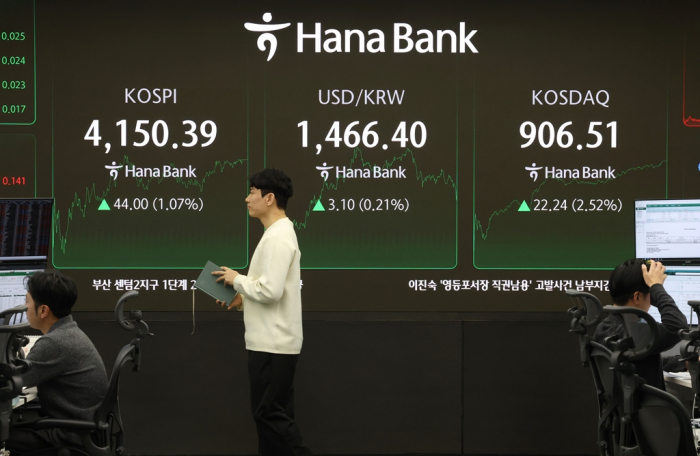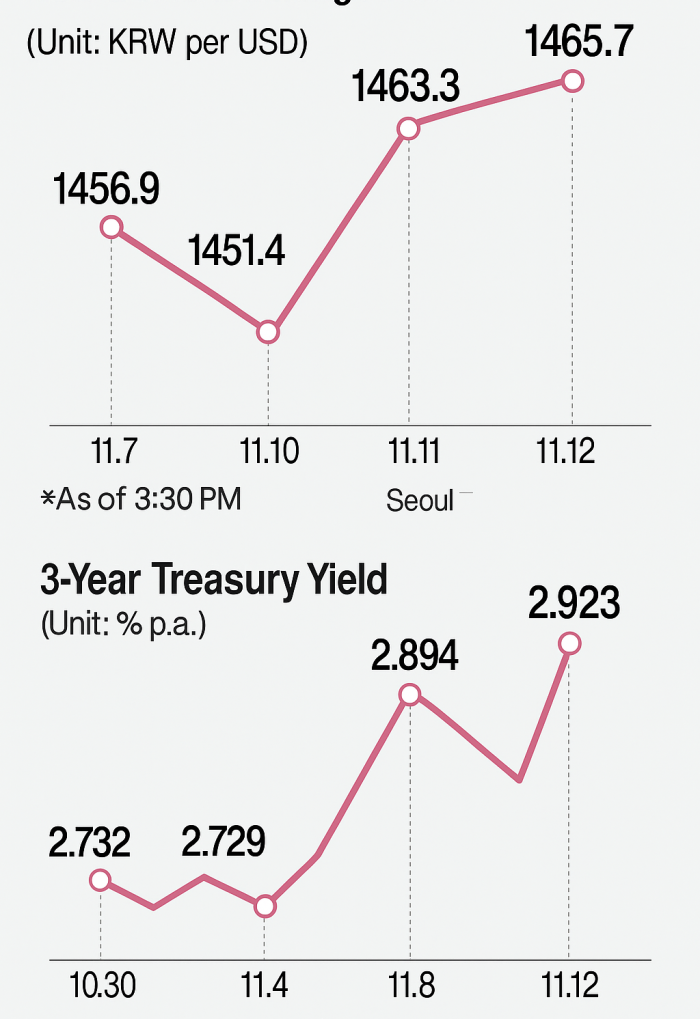The South Korean received slid to its weakest stage in seven months on Wednesday, briefly touching 1,470 in opposition to the greenback, as overseas traders pulled funds from native inventory markets and a tumbling Japanese yen dragged regional currencies decrease.
The dollar-won alternate fee has returned to ranges seen in the course of the nation’s interval of political turmoil triggered by then-President Yoon Suk Yeol’s short-lived declaration of martial legislation.
Financial institution of Korea Governor Rhee Chang-yong cautioned that markets are “overreacting” to exterior uncertainties. He signaled that the central financial institution is able to intervene if volatility intensifies.
HEAVY FOREIGN KOSPI SELLING, JAPANESE PM’S COMMENTS
The received closed at a seven-month low of 1,465.7 per greenback in Seoul’s onshore market, down 2.4 received from yesterday’s shut.

The forex opened barely firmer at 1,461 received however quickly reversed course as danger aversion swept by native markets.
The alternate fee touched an intraday low of 1,470.0 per greenback, posting the received’s weakest since April 9, when the dollar-won fee hit 1,484.1 amid escalating US-China tensions.
Analysts attributed the softer received to overseas traders’ heavy promoting within the inventory market.
International traders offered a internet 427.8 billion received value of shares on the primary bourse, accelerating capital outflows from Korean equities.
Analysts stated foreigners are on a promoting spree to e-book beneficial properties from their funding in Korean equities.

Continued greenback demand from Korean retail traders for abroad property, together with US shares, has additionally added downward strain on the received.
The received’s weak point was amplified by the yen’s decline, with the Japanese forex hovering round 154 yen to the greenback as Tokyo’s fiscal stance continued to prioritize stimulus over debt consolidation.
Feedback from Japanese Prime Minister Sanae Takaichi, highlighting progress assist over fiscal restraint, deepened expectations of extended financial easing, analysts stated.
The received has been buying and selling at ranges paying homage to December 2024, when the declaration of martial legislation fueled political uncertainty and drove the alternate fee as excessive as 1,442 on Dec. 3.

It stayed between 1,410 received and 1,480 received for about 5 months earlier than strengthening to the 1,300 received vary this Could.
However the forex has now spent 31 consecutive buying and selling days above the 1,400 received per greenback stage.
Economists in Seoul stated the received may attain 1,500 by year-end if the present development continues.
BOK CHIEF WARNS OF EXCESSIVE VOLATILITY
In an interview with Bloomberg Information in Singapore on Wednesday, BOK Gov. Rhee pointed to a sequence of exterior headwinds, together with volatility in US synthetic intelligence shares, financial ramifications of the US authorities shutdown, Japan’s coverage uncertainty, US-China commerce tensions and the yet-to-be-finalized US-Korea funding packages, as components driving the received’s weak point.

“Markets seem excessively delicate to those uncertainties,” he stated, including that authorities stood able to act if swings turned disorderly.
His remarks prompted a quick pullback of the greenback versus the received in the course of the afternoon buying and selling in Seoul, as forex merchants took the BOK governor’s remarks as a verbal intervention to stabilize the overseas alternate fee.
BOND YIELDS SURGE ON BOK CHIEF’S HINTS OF POLICY SHIFT
Authorities bond yields climbed throughout the curve as traders interpreted Rhee’s feedback on financial coverage as hinting at a attainable shift in coverage course.
The three-year treasury yield rose 9.2 foundation factors to shut at 2.923% in Seoul – a brand new excessive for the 12 months – whereas the 10-year yield gained 8.1 foundation factors to three.282%. The five-year be aware climbed 9.7 foundation factors to three.088%.

Throughout the Blomberg interview, Rhee stated the “depth, timing and even the course” of future coverage fee changes would rely on incoming knowledge – a comment that some merchants learn as signaling the tip of the easing cycle.
Though Rhee reiterated that the central financial institution’s official stance remained targeted on sustaining an accommodative coverage “given the still-negative output hole,” markets largely ignored the caveat.
The BOK later sought to minimize hypothesis, saying the governor’s feedback mirrored a “data-dependent” precept slightly than a sign of coverage tightening.
“The main focus ought to stay on sustaining an accommodative financial stance,” stated a BOK official.

